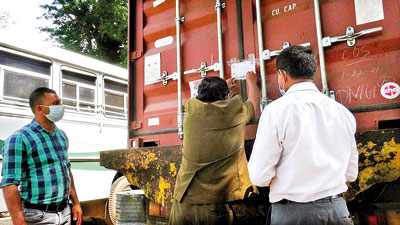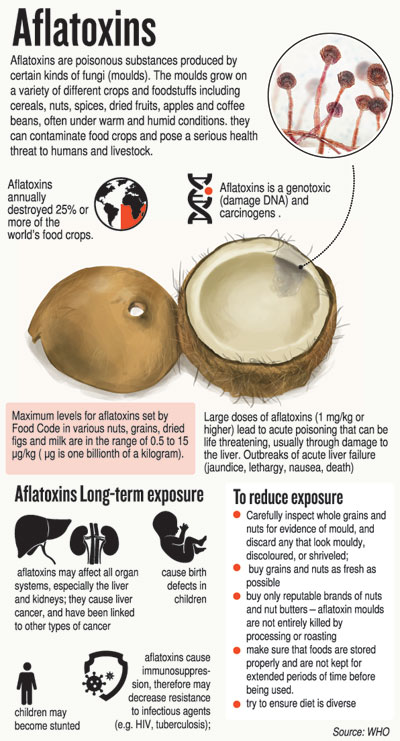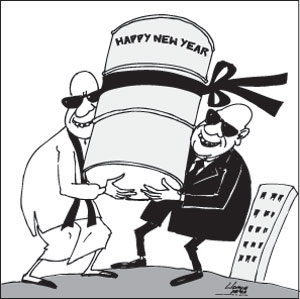News
When contaminated coconut oil seeps through system loopholes

The container that was taken into custody in Dambulla
As the controversy over harmful coconut oil stocks continued, yesterday the authorities said they were unable to confirm whether the contaminated oil had reached the consumers.
The Customs, Public Health Inspectors and Food Control Administration Unit (FCAU) of the Health Ministry said a string of investigations were underway into the import and could take time as they were to ascertain whether the harmful oil had entered the markets.
But Public Health Inspectors Union chief Upul Rohana said it might be even difficult to find out if the harmful oil with high levels of cancer causing Aflatoxins had entered the market.
“We have to depend on the Government Analyst’s report which may take more than a month. The process is extremely slow,” he said.
He said that so far they had sent more than a hundred samples collected by PHIs to the Government Analyst.
Mr Rohana said there was also a possibility that the harmful oil stocks had been mixed with the normal stocks and if that was the case, it would be difficult to detect as to who was selling and distributing the harmful oil.
The PHI chief said they could not take legal action until they got the Government Analyst’s report.
“What we are doing now is collecting samples from the market and submitting them to the Government Analyst, but by the time the report comes, the oil could have been consumed by the people,” he said.
Customs Director General Major General (Retired) G. Vijitha Ravipriya said they were also investigating whether any of the importers had actually released the stocks to the markets in defiance of the order not to release the stocks to the market.
He said Customs investigators would check the quantity of the consignment being held back at private warehouses to ascertain whether parts of the stock had been released to the market.
“The importers cannot refine, or release, crude oil until the Sri Lanka Standards Institution (SLSI) and the Health Ministry’s Food Control Administrative Unity (FCAU) reports certify that the stocks are suitable for human consumption. That is the condition we place when we allow them to store the stocks at private warehouses under commercial bonds.”
The Customs chief said importers were allowed to store their stocks in private bonded warehouses due to the lack of space at Customs warehouses. He said this practice had now been suspended following the controversy and as a result, importers would have now bear the customs warehouse costs.

Police officers inspecting cans of coconut oil at the Dambulla store
Custom sources said they normally sealed every container before they were sent to private warehouses, but there was a high possibility the oil containers were unsealed to enable the importers to remove and refine the oil.
The questionable oil stocks were imported by three companies. The total amounts to 1.8 million kilograms. The stocks of a fourth company were cleared on the grounds that the oil was not contaminated.
Based on the samples, the SLSI and the FCAU confirmed the imported coconut oil contained the carcinogenic chemical Aflatoxin.
Early last month, in a letter, the FCAU informed the Customs that the oil was contaminated with the carcinogenic substance and therefore not suitable for human consumption. It recommended the stocks be re-exported to the country of origin.
FCAU Director Thilak Siriwardena said although they entered it in the online system, no action was taken to re-export the stocks. “I don’t know whether the Customs have procedures to follow,” he said.
SLSI Director General Siddhika Senaratne told the Sunday times samples were sent to both the SLSI and FCAU but the SLSI was bound by their standard guidelines which required that samples be taken from every container whereas the FCAU took random samples and was quicker with its report and recommendation that the stocks be re-exported.
“The SLSI is bound to inform the importer and the customs about our findings, and if the importer calls for a second report we are bound to carry out the second test,” she said.
The DG said that if the consignments were to be released both the institutes should certify that the stocks were suitable for human consumption.
The SLSI’s second report was released only this week, enabling the Customs to begin the re-export process.
 Colombo’s Chief Medical Officer Ruwan Wijeyamuni said they were unable to check whether Aflatoxin-contaminated coconut oil was being sold in Colombo city because CMC labs were not equipped to conduct such tests.
Colombo’s Chief Medical Officer Ruwan Wijeyamuni said they were unable to check whether Aflatoxin-contaminated coconut oil was being sold in Colombo city because CMC labs were not equipped to conduct such tests.
This week, the detection of vehicles carrying coconut oil, prompted investigations to find out whether oil had been removed from the private bonded warehouse.
The latest detection was made on Thursday in Dambulla while oil was being unloaded from a container to a storage facility behind the Dambulla Economic centre.
Following the detection, on Friday Dambulla Acting Magistrate Niluka Wijethilaka ordered the Dambulla Chief PHI to collect samples of the coconut oil and obtain a report from the Industrial Technology Institute (ITI).
Accordingly, Dambulla’s Chief PHI Priyantha de Silva and Matale District food drug inspector M. L. Jayaweera collected coconut oil samples from the container being detained at the Dambulla Police station. They also sealed the container and the storage facility near the Dambulla Economic Centre.
The Dambulla detection came two days after Marawila Police detected two bowsers carrying contaminated coconut oil. The bowsers had been parked behind a private factory, provoking suspicion.
Marawila Chief Magistrate Rakitha Abeysinghe ordered the IGP to obtain samples and submit the Government Analyst’s report.
During the court hearing the following day, it was revealed the Dankotuwa police had handed over the two bowsers to the Customs under Police protection. Police told court they followed advice from the police legal division.
This prompted the magistrate to ask the OIC whether he was disregarding the judicial procedure and court orders. The Magistrate asked the OIC why he handed over the bowsers to the Customs when the Customs had failed to protect the questionable coconut oil stocks under their watch. He said the decision to hand over the bowsers to the Customs should have been taken only after the Government Analyst’s report had been obtained.
A senior Dankotuwa police officer told the Sunday Times they handed over the two bowsers in keeping with the legal procedure.
He said they reported the detection to the Marawila Magistrate as an extra measure and handed over the two bowsers to the Customs the following day.
“We did not override or ignore the magistrate’s order. Actually, in this case, legal action has to be initiated in terms of the Customs Act,” the officer said.
He said the Police handed over the bowsers to the Customs after obtaining advice from the Police legal division and superior officers.
Police Media spokesman Ajith Rohana, however, said the police legal division had advised the Dankotuwa OIC to report the detection to the Marawila Magistrate courts and act according to the court’s instructions.
 “The police officer via a B report informed the Magistrate courts, while a sub inspector made a request from court to hand over the bowsers to the Customs in view of the current situation,” he said.
“The police officer via a B report informed the Magistrate courts, while a sub inspector made a request from court to hand over the bowsers to the Customs in view of the current situation,” he said.
Deputy Inspector General Rohana said he had called for the relevant documents and he would be able to explain the Police action once he studied them.
Meanwhile, All Ceylon Traditional Coconut oil Manufarcturer’s Association (ACTCOMA) Convener Buddhika de Silva said the controversy had exposed the lacuna in the chain of responsibility.
He said the Coconut Development Authority was the body responsible for coconut related affairs including exports and imports, but it had not taken any action in this regard.
| What is Aflatoxin The carcinogenic chemical aflatoxin is not only found in coconut oil, said Colombo’s Chief Medical Officer Ruwan Wijayamuni. He said the chemical is formed when a fungus identified as asparagus grows in nuts and grains. “ If copra (dried coconut kernel) is not properly dried, the asparagus fungus grows on it, and secretes the toxin. When oil is extracted from such copra, the toxin is also mixed into the oil,” Dr. Wijayamuni explained. | |
(Additional reporting Kanchana Kumara Ariyadasa)


